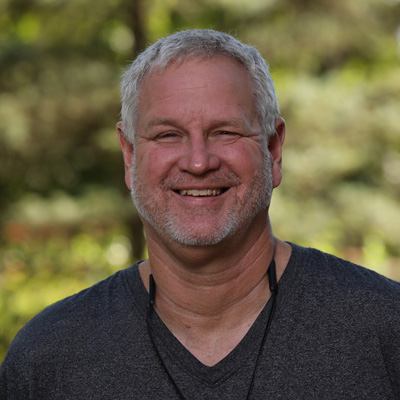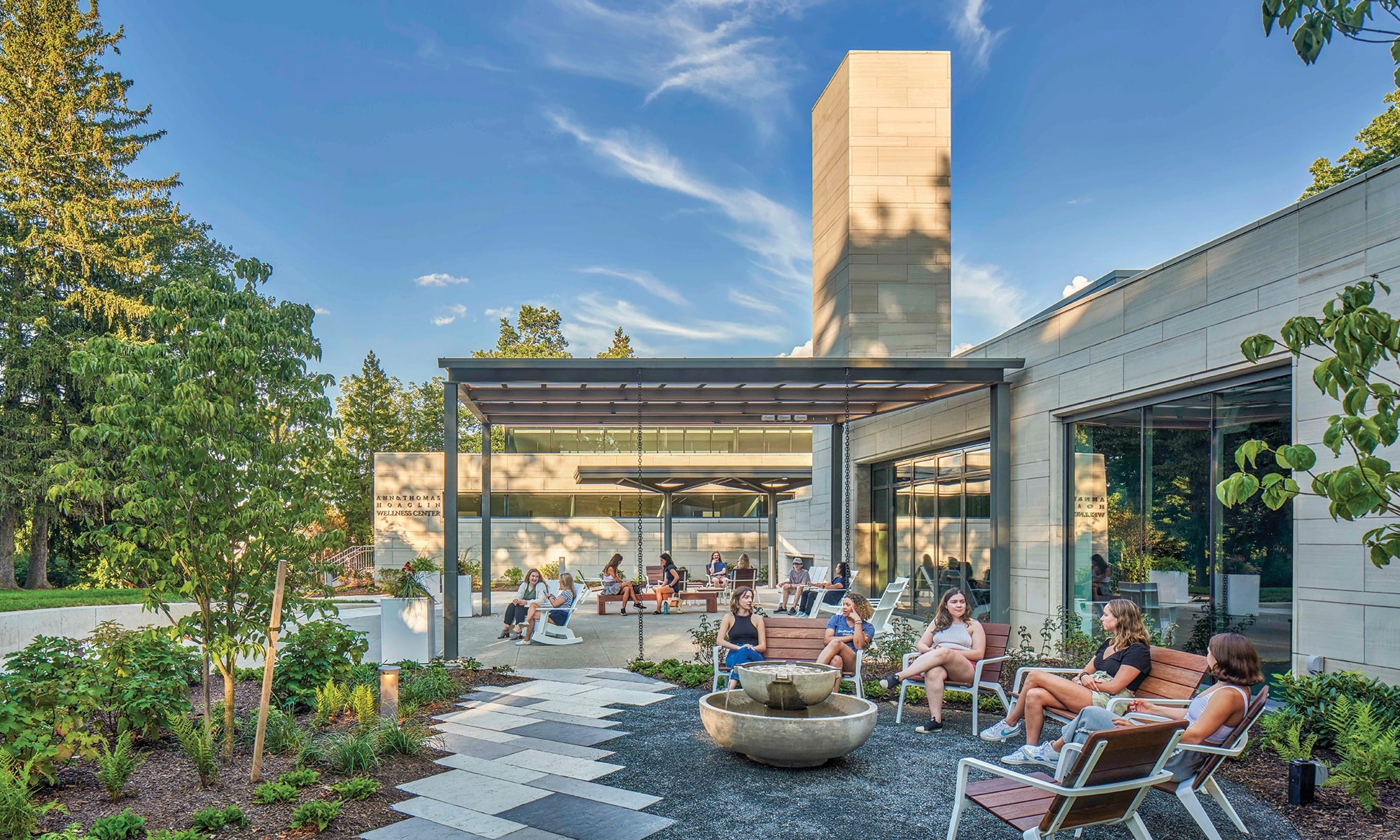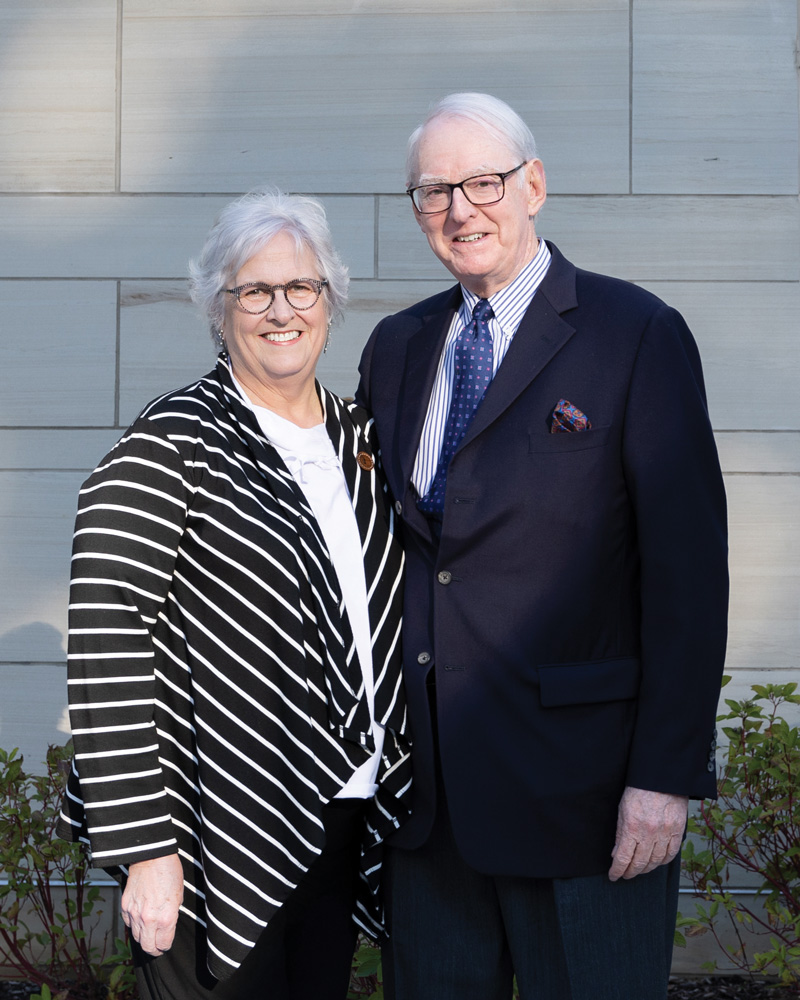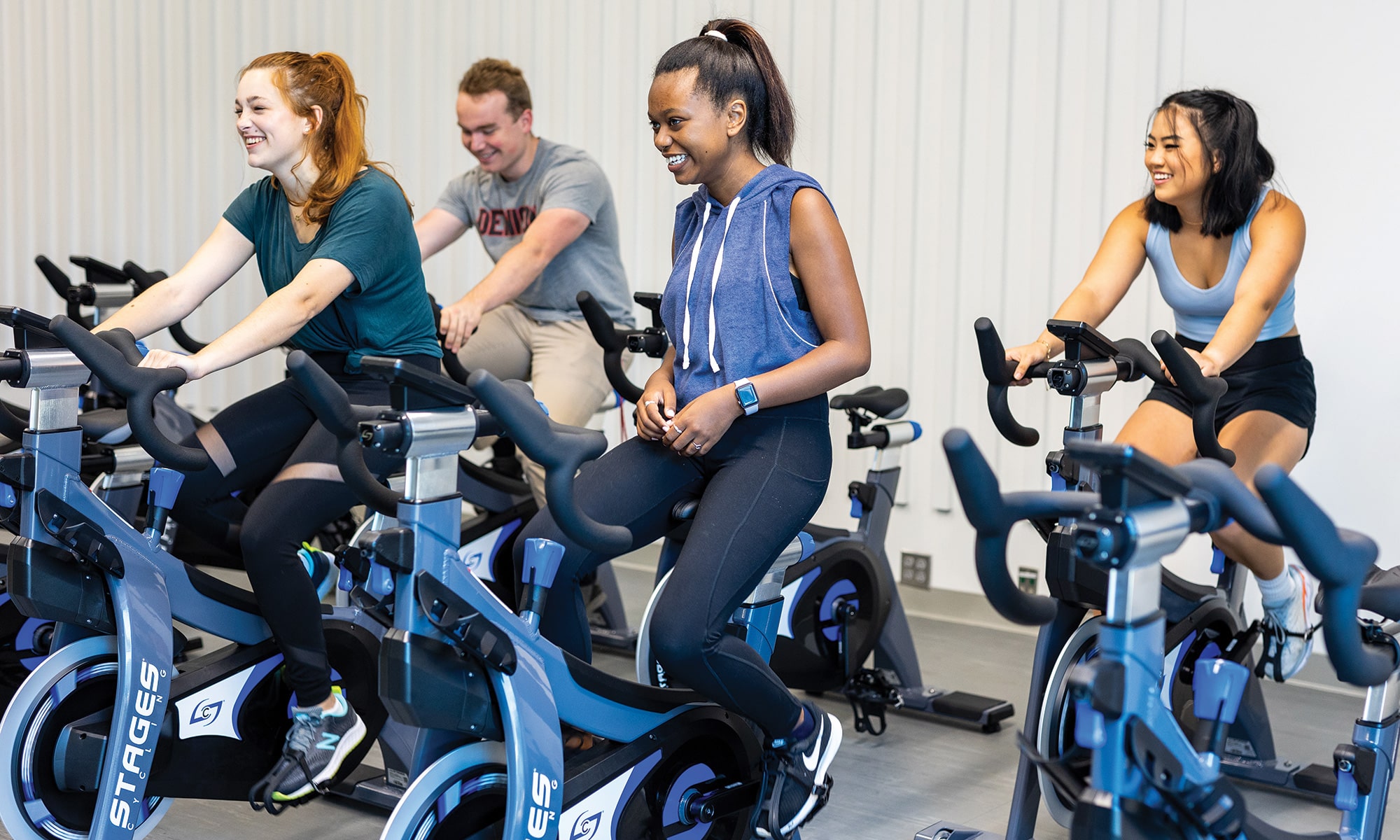When Raina Runk ’24 walks through the Ann and Thomas Hoaglin Wellness Center, what she doesn’t see tells as much a story about Denison’s commitment to well-being as what she does see.
Runk doesn’t notice many fellow students glued to their cell phones as they participate in programs to promote mindfulness. She doesn’t observe them sitting in the spacious lobby or the outdoor meditation garden with noses buried in laptops.
What Runk often witnesses, she says, are students using the 16,000-square-foot center for one of its intended purposes — a place to quiet the mind and recharge the body.
With the 2022 opening of the Hoaglin Wellness Center, a single-story limestone structure that sits along Chapel Walk, Denison has expanded both on-campus health services and access to health care professionals — largely through a new partnership with the Ohio State University Wexner Medical Center, one of the region’s most respected and established academic health centers.
Students, faculty, and staff can access musculoskeletal and soon physical therapy services through the new partnership, and students can consult with primary care providers, mental health clinicians, psychiatrists, and nutritionists at the Hoaglin Wellness Center.
The college community is also taking advantage of the center’s wellness-centered programs and opportunities. More than 2,200 students and staff members registered for wellness programs in the first two months.
“Before Covid, you would hear professors and faculty members say that it’s important to take time away from school work and just de-stress,” Runk said. “But I think there was a disconnect between what was being said and what was being done. Since this space opened, I see more students taking the time to do that.”
A timely addition
Even before the first spade of dirt was turned at groundbreaking, the university sought to accommodate a generation of students looking for resources to manage their own well-being.
“There has been a huge shift,” said Jack Wheeler, associate director of student wellness at the Hoaglin Center. “This generation is far more likely to have a conversation about their mental-health journey or just their general mental well-being. They also are a lot quicker to seek services.”
In recent years, Denison has broadened its definition of wellness, creating educational programs that encourage a holistic approach and helping students develop the habits and skills to manage their health and well-being throughout their lifetimes. Denison was among five universities in 2020 to earn an Active Minds Healthy Campus Award, which recognizes excellence in prioritizing the health and well-being of students.
Emphasizing the importance of sleep, nutrition, and exercise for physical and mental health, President Adam Weinberg has been a vocal proponent of helping students develop “emotional agility and resilience” that enables them to thrive at Denison and in the years beyond.
“It’s nice to have a place where you can come enjoy some peace and take care of yourself.”
The centerpiece of this effort is the Hoaglin Wellness Center, named for Ann and Tom Hoaglin, to honor their philanthropic leadership of the project. The Hoaglins, both members of the Denison Class of 1971, are long-time civic champions and passionate advocates for their alma mater, and their vision for the center inspired several Denison alumni and parents of Denison students to support the project financially.
The facility’s arrival on campus came at an ideal time.
Majeda Humeidan, Hoaglin’s director of mental well-being and psychologist, noted that young adults across the nation have experienced a rise in mental health concerns in recent years. She cited a study from the Collegiate Mental Health Report that found 72% of American college students say Covid has impacted their mental health in a negative way.
“Young adults are aware of the strong connection between mental and physical health,” Humeidan said. “Having the Hoaglin Center at Denison that attends to the whole person allows students to more holistically engage in their well-being.”
She also referenced a survey from the Census Bureau that states symptoms of anxiety and depression “on a near-daily basis” had spiked to 41% among adults in 2021 — a 30% increase from 2019. Beyond isolation and other challenges faced during the pandemic, factors such as the political climate, uncertainty about the future, and changes in access to social support have contributed to a rise in anxiety, according to a 2022 Harris poll.
Humeidan is one of seven full-time mental health clinicians working at the Hoaglin Center’s counseling services, which was also joined by a part-time psychiatrist from the Wexner Medical Center. One-on-one mental health assessments and therapy sessions are common at most universities, and necessary for diagnosable clinical mental health disorders, but Humeidan lauds the proactive work of Denison’s wellness programs.
“When students come to us, they are quite positive about the new center, its location, and quick access to a broad range of services,” she said. “We are continuing to assess needs and looking to increase collaboration across departments to enhance positive coping, emotional regulation, and self care among students — all skills that can also be taught outside of one-on-one counseling.”
‘Drop in and turn off’
Twice a week, Brooklyn Heller ’24 visits the wellness center to participate in yoga classes. There’s much she appreciates about the Hoaglin facility, not the least of which is the presence of natural light that pours through 2,600-square feet of windows.
But it’s the serenity of the wellness center’s environment that helps her relieve stress after a busy day of classes.
“With our crazy schedules,” Heller said, “it’s nice to have a place where you can come and enjoy some peace and take care of yourself.”
Students are using the new facility for a wide variety of reasons beyond medical treatment and counseling. There are rooms for meditation, yoga, spinning, and group chats. Visits from therapy dogs are popular, as are the occasional campfires, morning smoothies, and paint nights.
“They see this as a space where they can relax and de-stress in an atmosphere that’s different than what’s going on across campus”
The wellness rooms, which students, staff, and faculty can reserve for 30-minute visits, are a huge hit. Occupants can relax in massage chairs, listen to soft music and trickling water, and indulge in aromatherapy.
“Sometimes, all you need is just a few minutes to drop in and turn off,” Wheeler said. “Students who come in seem to be more optimistic and hopeful. They see this as a space where they can relax and de-stress in an atmosphere that’s different than what’s going on across campus.”




